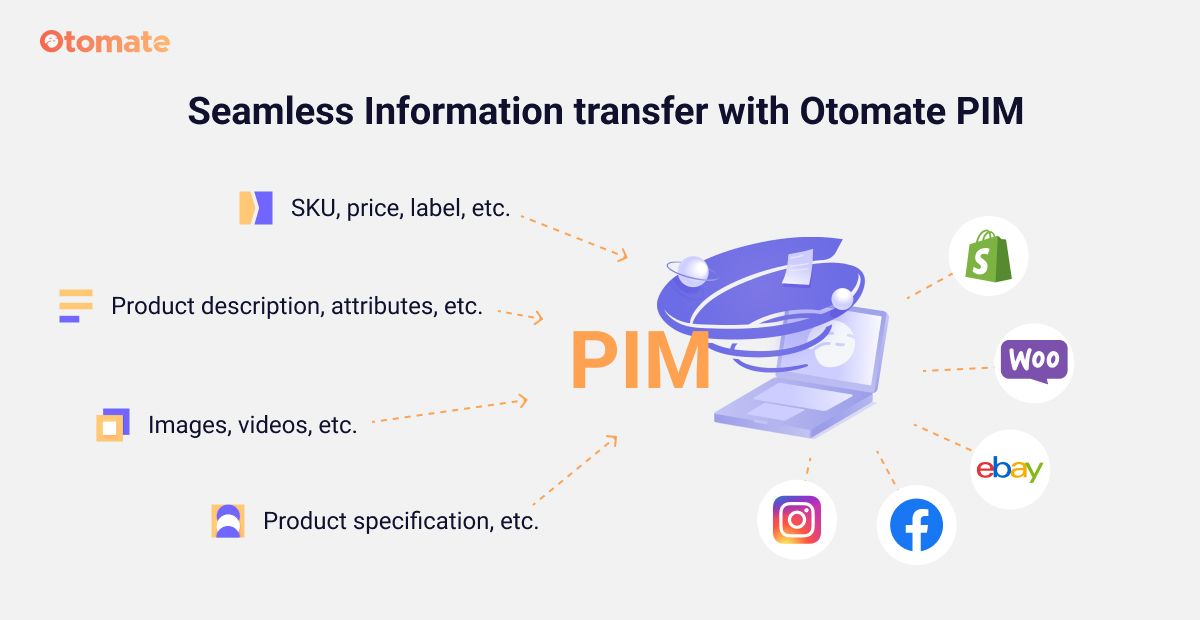Top 14 PIM Features
Discover the top 14 PIM features that revolutionize how businesses organize, manage, and optimize their product information for improved efficiency and market reach.

By now, we have already learned a lot about PIM systems and their role in successful e-commerce workflow. But what about features? A robust PIM system can easily streamline the collection, management, and distribution of product information, enhancing product visibility, accuracy, and consistency across all sales channels.
In this article, we will delve into the top 14 PIM systems features that are critical for businesses looking to optimize their product management processes and propel their e-commerce success to new heights. Let’s start!
- The Core Feature: Efficient Product Data Management
- Handy Digital Asset Management
- Robust Import and Export Functions
- Advanced Filtering Capabilities
- Easy Bulk Product Actions
- Customizable Product Data Mapping
- Product Variants Management
- Support for Numerous Languages and Currencies
- Integration with e-Commerce Platforms
- Audit Log History
- Detailed Reporting and Analytics
- Workflow Management and Approval Processes
- Completeness Tracking
- API for Custom Integrations
- Wrapping Up
The Core Feature: Efficient Product Data Management
One of the key features of a PIM system is its ability to manage accurately product descriptions, technical specs, pricing details, and multimedia content. With the help of PIM software, this information is not just well-organized and easily accessible but also consistently updated across all sales channels.
The beauty of PIM lies in its simplification and automation of processes for tracking, collecting, and organizing product data. This ultimately saves businesses significant time and effort that would typically be spent on managing product information. Additionally, the ease of exporting data in various formats allows for seamless integration with other e-commerce tools and platforms, ultimately improving overall operations.
Handy Digital Asset Management
This is a powerful tool that helps centralize and organize all your product and brand assets. Digital Asset Management (DAM) includes images, documents, videos, and audio files in various formats like .jpg, .png, .gif, .pdf, .doc, .ppt, .odt, .xls, .psd, .mp3, .mp4, .mov, and more. By having a single place for all these assets, DAM makes it easier to store, organize, and manage digital content.

This ensures that the right assets are always available for marketing purposes. It not only improves efficiency and consistency in branding and messaging but also makes sharing assets easier.
Robust Import and Export Functions
The ability to import and export data is essential for any PIM software. These functions help with integrating and sharing product information seamlessly. Importing data from different sources is made easier with saved mapping profiles, allowing for quick and efficient data transfer. This ensures that product details are always up-to-date without the need for manual input.
In addition, a good PIM system should have flexible export options, allowing users to extract data in various formats like CSV, XLSX, or PDF. This versatility is important for meeting different business requirements, such as updating e-commerce platforms and partner databases. The ability to import and export data efficiently not only saves time but also enhances accuracy and consistency across all channels, contributing to a cohesive and compelling product presentation.
Advanced Filtering Capabilities
This feature is needed for navigating through an expanding product catalog, as it allows users to pinpoint specific product information quickly, regardless of the catalog's size or the diversity of products offered. The ability to apply multiple filters based on various attributes and conditions simultaneously streamlines the search process, making it more efficient and tailored to precise needs.
By customizing and preserving these filters, users can revisit specific product views with a single click, significantly reducing the time spent searching for recurring product sets. Advanced filtering thus not only enhances usability but also enables businesses to adapt their product management processes to scale, ensuring that vital product data is always within easy reach.
Easy Bulk Product Actions
This is a real game-changer for managing extensive product information in a PIM system: it simplifies the process of updating data across multiple products simultaneously, allowing for efficient, collective modifications. Whether it’s updating product descriptions, prices, or attributes, bulk actions save valuable time and effort, eliminating the need for tedious, manual updates on an individual basis.

Moreover, this capability ensures brand consistency across all platforms, especially crucial during rebranding phases or when making significant product updates. By enabling the alignment of product data with new brand guidelines or market strategies across all sales channels from a single point, it prevents discrepancies and maintains a cohesive brand image.
Customizable Product Data Mapping
The key benefit of customizable mapping is the prevention of errors and discrepancies in product listings, safeguarding the integrity of your brand and product presentation. It allows for a streamlined process of organizing and structuring product data, catering to the unique demands of each platform while maintaining a coherent and uniform product catalog. This adaptability is crucial for businesses looking to expand their reach across multiple online marketplaces without compromising on data accuracy or consistency.
Product Variants Management
It’s a crucial feature in any PIM software, simplifying the organization and administration of a product's multiple versions, which may vary by size, color, material, and more. This capability is invaluable for retailers and manufacturers dealing with an extensive array of product variations.
Thanks to centralized management within a PIM system, businesses can effortlessly monitor these variations, guaranteeing customers receive precise and current information. A comprehensive approach to managing product variants not only enhances inventory oversight and ensures consistency in pricing and availability but also may include sophisticated functionalities such as the auto-generation of variants and the capability to manage them in bulk. This results in a more streamlined operation, optimizing the presentation and sale of diverse product offerings.
Support for Numerous Languages and Currencies
This feature enables businesses to effortlessly create and manage stores across diverse geographies, each tailored to local languages and currencies, thus significantly expanding their market reach.
With a PIM solution, eCommerce managers can centralize the management of these multinational stores, ensuring that each store is accurately localized in terms of language and currency. This not only enhances the shopping experience for international customers but also streamlines the backend management process, allowing businesses to efficiently cater to a global audience.
Integration with e-Commerce Platforms
This functionality facilitates seamless connection and integration with various e-commerce platforms such as Shopify, Amazon, eBay, and others, allowing for the centralized management of product information.

By utilizing this feature, businesses can ensure consistent and accurate product data across all platforms, enhancing the customer experience and potentially increasing sales. Additionally, this integration capability makes it simpler to expand your brand's presence both locally and globally, enabling you to reach a broader customer base with ease. This feature essentially acts as a bridge, efficiently distributing your products to multiple stores and marketplaces with a single action, streamlining the process of multi-channel marketing.
Audit Log History
Audit Log History and Versioning offer indispensable capabilities for maintaining comprehensive oversight and control over the product catalog within a PIM solution. This feature enables you to meticulously monitor all modifications to your product information, ensuring an in-depth understanding of who made each change, what was altered, and when these changes occurred.
This aspect of PIM is especially beneficial in collaborative environments where multiple team members, potentially from various global locations, have the ability to edit and update product data. With versioning and audit logs, you can effortlessly maintain a cohesive and transparent record of all edits, providing valuable context and minimizing the risk of errors or data inconsistencies. This ensures not only the integrity of your product information but also facilitates a streamlined workflow among team members, enhancing efficiency and productivity in managing your product catalog.
Detailed Reporting and Analytics
As you may guess, reporting and analytics in product information management systems empower businesses with the capability to meticulously monitor and evaluate their product data through both real-time insights and historical analysis. This functionality not only streamlines the process of generating comprehensive reports but also significantly conserves time that would otherwise be spent on manual report preparation.

By leveraging these advanced analytics tools, companies can swiftly identify trends, pinpoint areas of improvement, and make informed decisions to optimize their product strategies. This level of analysis ensures that businesses can adapt to market demands, enhance product performance, and ultimately drive more effective and targeted marketing efforts. The immediate accessibility to actionable data through PIM's reporting and analytics feature is crucial for maintaining a competitive edge in the fast-paced eCommerce landscape.
Workflow Management and Approval Processes
This feature is pivotal for the efficient organization, verification, and consistency of product information. These features meticulously outline task sequences, ensuring that every piece of data undergoes a rigorous approval process before becoming finalized. This systematic approach to data management significantly enhances collaboration among team members, streamlines operations, and boosts overall productivity.
Moreover, it plays a critical role in:
- Streamlining the data organization process to ensure a structured approach to information handling;
- Facilitating seamless collaboration across departments, ensuring all stakeholders are aligned;
- Amplifying productivity by automating repetitive tasks and focusing on strategic activities.
- Minimizing errors and inaccuracies, thereby preserving data integrity;
- Saving valuable time through automated notifications about discrepancies or missing information;
- Safeguarding brand reputation by ensuring all public-facing information is accurate and consistent;
- Accelerating the time-to-market for products by ensuring quicker approval cycles.
Ultimately, PIM’s workflow management and approval processes not only safeguard data accuracy but also empower businesses to launch products faster and more reliably, thereby protecting the brand and enhancing customer trust.
Completeness Tracking
Completeness Tracking and Data Enrichment are key functionalities within a product information management system that ensure your product listings are thorough, accurate, and of high quality across all eCommerce channels. This feature scrutinizes your product catalog to identify and highlight missing elements, guiding users to fill these gaps for enhanced data integrity and consistency.
Key aspects include:
- Enabling a meticulous review of product listings to ensure all necessary information is present and accurate, thereby facilitating informed purchasing decisions for customers;
- Automating the process of data quality improvement, utilizing internal or external datasets to fill in missing information and enrich product descriptions;
- Implementing validation rules and workflow checks to maintain data quality, alongside version control to track changes and updates to product information;
- They are providing detailed reports and alerts on data quality, helping teams prioritize updates and maintain a high standard of information completeness.
By leveraging these features, businesses can significantly improve the customer shopping experience, reduce the risk of returns due to incomplete product catalogs, and increase overall customer satisfaction and trust in the brand.
API for Custom Integrations
It allows for seamless connection and data exchange between the PIM and other business systems such as eCommerce platforms, ERP, CRM, and marketing tools. This feature enables organizations to automate the synchronization of product information across various channels, ensuring data consistency and accuracy.
Key aspects include:
- Enabling the PIM solution to become a central hub for product information that can easily share data with external systems, improving operational efficiency and reducing manual data entry errors;
- Allowing for the development of tailored integrations that meet specific business needs, making it possible to create a highly customized and automated workflow for product information management;
- Providing developers with the tools and documentation necessary to create secure and robust integrations, ensuring that product data flows smoothly between systems without compromising data integrity.
By utilizing APIs for custom integrations, businesses can ensure that their product information is up-to-date and consistent across all sales and marketing channels, leading to improved customer experiences and more efficient internal processes.
Wrapping Up
In wrapping up our exploration of top PIM features, it's evident how crucial these functionalities are for businesses aiming to streamline their product information management processes. Otomate PIM system incorporates a greater part of the discussed above features to deliver a comprehensive and efficient solution.
Its advanced filtering and easy bulk product actions simplify managing extensive product catalogs while customizable product data mapping and product variants management ensure that data remains consistent across platforms. Integration capabilities with e-commerce platforms and marketplaces expand the reach of your products. Lastly, Otomate.shop's Reporting and Analytics provide insights into product data changes and performance, enhancing decision-making.

These features collectively make Otomate an ideal tool for e-commerce businesses looking to optimize their product information management and ensure their products stand out in a competitive marketplace.
Don’t hesitate to try Otomate right now and boost your e-commerce business efficiency, and you if have any related questions, our expert team is here to help you out!




